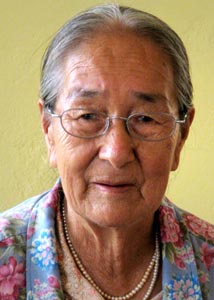Name: Sonam Tso
(Alias: No)
Gender: Female
Interview Age: 81
Date of Birth: 1929
Birthplace: Rong Shinglaykha, Amdo, Tibet
Year Left Tibet: 1959
Profession: Farming
Monk/Nun: No
Political Prisoner: No

Interview No.: 13M
Date: 2010-04-07
Language: Tibetan
Location: Doeguling Settlement, Mundgod, Karnataka, India
Categories: Culture and History
Keywords: Amdo, childhood memories, Chinese -- first appearance of, Chinese -- oppression under, Chinese rule -- life under, customs/traditions, environment/wildlife, escape experiences, farm life, festivals, houses/villages, pilgrimage, refugee in India -- life as, starvation, sterilization
Summary:
Sonam Tso's family engaged in farming growing wheat, barley and peas. The surroundings of her village were abundant in various types of flowers and fruits, which grew wild in the forests. She talks about how the villagers helped each other during farming and constructing houses as there were no workers for hire. She describes the food of the people of her region, their way of building houses by using local materials, preserving the wild pear for the winter and an account of death rituals and sky burial.
The Chinese came to Sonam Tso's region when she was around 18 or 19 and she describes how the Tibetan people were first deceived and then subjected to torture and starvation. She reveals that all of the young men and women of her village were forcibly sterilized by the Chinese.
Feeling unsafe there, Sonam Tso sold all her jewelry and fine clothes to travel to Lhasa with her husband. She also traveled to India on pilgrimage and returned to Tibet for only a year until Lhasa was occupied. After her husband joined the resistance army in Lhasa, Sonam Tso escaped to India and was fortunate to meet her husband later while working on a road construction crew.
Interview Team:
- Marcella Adamski (Interviewer)
- Tenzin Yangchen (Interpreter)
- Pema Tashi (Videographer)

